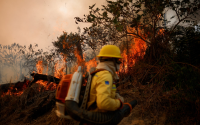26 August 2007Erica Etelson
When Hurricane Katrina struck two years ago, Americans learned just how ill-equipped the government is to respond effectively to natural disasters. But if you think the government's response to Katrina was inept, brace yourself for peak oil.
Global oil production will hit its peak in the next few years, at which point oil prices will skyrocket and voracious consumers like the United States, China and Europe will quickly drain every last barrel they can afford to buy. Our per-capita oil consumption is double that of most European nations and more than triple Mexico's, and shows no sign of slowing. As supplies dwindle, an economic disaster on a par with Katrina will start to unfold.
Global oil demand is at 84 million barrels a day and rising, and there are at most a trillion barrels' worth still in the ground, most of which is very difficult and expensive to recover. Do the math, and you'll see that the end of oil is, at most, 30 years away.
But long before oil actually runs out, economists and energy analysts warn that extreme scarcity will cause prices to soar so high that it will no longer be feasible to use petroleum on a wide scale. It is the imminence of this supply-demand shortfall that has people like National Petroleum Council member Matthew Simmons and Reps. Roscoe Bartlett, R-Md., and Tom Udall, D-N.M., worried - very worried - about our economy's ability to withstand the end of oil.
Cheap and plentiful oil is the foundation of our economy. Everything from food production and distribution to the manufacture of clothing, footwear, medications and plastic goods relies heavily on petroleum. You name it, and we need oil to produce it, ship it and, in many cases, run it.
In February, the U.S. Government Accountability Office dropped a quiet little bombshell: a report on peak oil concluding that there is an urgent need for a swift, coordinated government strategy to assess and develop alternative energy technologies to avert "severe economic damage."
The agency concluded: "(T)he United States, as the largest consumer of oil and one of the nations most heavily dependent on oil for transportation, may be especially vulnerable among the industrialized nations of the world." Stark though its conclusion is, the GAO may in fact be understating the gravity of the situation.
The report followed on the heels of a 2005 peak oil risk management report commissioned by the Department of Energy, which warned of the "extremely damaging" and "chaotic" impacts that will ensue if "intensive," "aggressive" and "expensive" mitigation measures are not put in place at least 10 years ahead of time. Both reports landed with a dull thud and have been dutifully ignored. In other words, there is no Plan B.
Depending on whom you ask, the impacts of peak oil range from dire to catastrophic: At best, get ready for a crippling recession and widespread inflation. At worst, we face severe global food shortages that threaten wide-scale starvation and an overall breakdown of social and economic institutions. And if history is any guide, we can expect a series of military invasions into every remaining oil hot spot in the world - invasions that may, by the way, require even more fossil fuels than we could possibly expropriate by force.
Because oil companies and OPEC nations are notorious for overstating their reserves to manipulate the market, it is impossible to predict when exactly the world will start feeling the crunch. As award-winning New York Times reporter Peter Maas wrote in 2005, "Because we do not know when a supply-demand shortfall might arrive, we do not know when to begin preparing for it, so as to soften its impact; the economic blow may come as a sledgehammer from the darkness."
But here's a little hint: Crude oil futures hit an all-time high of $78.21 per barrel on July 31. Prices cannot go much higher without us beginning to feel the foreshocks of a peak oil catastrophe. Oh, and by the way, natural gas (which provides 42 percent of California's power) is running out, too. One day, even coal will be gone. How much longer are we going to wait before we figure out how to survive without fossil fuels?
The United States has reacted to the threat of peak oil and gas with all the alacrity of its response to climate change. It is ignoring the looming crisis for as long as it can, just waiting for that sledgehammer to land its first blow. Eventually, when a recession hits, tax revenue will plummet, and the government will have nowhere near the money it needs to build an alternative energy and transportation infrastructure. Every year that goes by without an intensive mobilization to build an oil-independent economy diminishes our odds of surviving the end of oil.
States, too, seem to have their heads in the sand. California, considered a leader in efforts to reduce carbon emissions, just cut funding for mass transit by $1.3 billion for the fiscal year. Like most states, it ignores the urgent need to build a transportation network that does not rely on fossil fuels.
At this point, you might be asking yourself: When oil becomes scarce, how will I get food? That's a very good question. Here are a few more: Will my garbage get picked up? How will my water district purify and deliver water and treat sewage without petrochemicals? What if I need an ambulance? What if my home is one of the 7.7 million that rely on oil for heating? Which of my medications are made out of petrochemicals? How will I get to work? Will I even have a job anymore?
But don't just ask yourself. Ask your elected officials, your public utility district and your grocer. Ask the U.S. Postal Service, Federal Express and American Airlines. Ask GM. If you have one, ask your financial adviser or stockbroker which companies will still be in business after peak oil hits. Odds are, he or she will give you a blank stare.
While the United States blindly carries on with business as usual, countries such as Sweden, Iceland and Ireland are taking steps to assess and mitigate peak oil impacts. Oil-rich Iran has begun rationing and has already cut oil consumption by 25 percent. But here at home, demand for oil is ever on the rise, and there is no talk of conserving reserves for essential goods and services or to develop an alternative energy infrastructure.
Instead, we are on course to squander every last drop on long solo commutes, leisure travel, mountains of plastic junk and the senseless transglobal shipment of unsustainably grown food.
That's where local government comes in. Small but growing numbers of municipalities are initiating a process that federal and state leaders should have begun 30 years ago, when domestic oil reserves peaked. They are, in short, figuring out Plan B.
In May, Oakland appointed an Oil Independent Oakland by 2020 Task Force. In June 2006, Portland, Ore., formed its own Peak Oil Task Force, which got busy fast: By March of this year, it had released its first major report, urging the city to "act big, act now," even without further study or analysis. The report prompted the city to pass a resolution to accelerate oil and gas conservation measures to halve Portland's fossil fuel consumption.
Last year, San Francisco passed a resolution to assess the city's vulnerability to oil depletion and to develop a transition plan. Other cities, from Austin, Texas, to Bloomington, Ind., are confronting the stark reality and trying their best to figure out how to soften the blow.
Cities are looking at options such as local food cultivation, urban redesign to minimize transportation needs, locally controlled electricity, rainwater catchment systems (to ensure local access to water for food cultivation), energy-efficient mass transit, and the preparation of emergency plans for sudden and severe food, water and energy shortages. They are embracing bio-regional sustainability - a concept once dismissed as an ecotopian fantasy that is suddenly starting to look like our last best hope.
But cities cannot solve the peak oil problem on their own. They don't have the revenue needed to build light-rail networks and wind farms or to store massive grain reserves. During a recession, they will be in no position to guarantee income supports for millions of laid-off workers. But the more they do now, while they still have a revenue stream, the better off their residents will be.
If the peak oil doomsday scenarios are to be averted, it will require coordinated action at every level of government, by every sector of the economy and by every community and citizen in the nation. We are heading into a political era in which the need to come together to invent and support life-sustaining social and economic systems will trump all else.
Some tout alternative energy technologies as the silver bullet that will save us from a peak oil crisis. But there is a broad consensus among energy analysts that it will be decades before such alternatives are available for wide-scale implementation. Moreover, some of the alternatives with the strongest political backing, including ethanol and liquefied coal, may cause even more severe global warming than petroleum has.
The United States needs to slam the brakes on fossil fuel consumption. As if arresting climate change weren't enough of a reason for immediate and strong conservation measures, the end of oil may just force upon Americans a reality we have ignored for far too long: We cannot go on like this, pedal to the metal, asleep at the wheel.
Erica Etelson is a Berkeley journalist, former environmental attorney and oil independence activist. Contact her at [email protected].
http://www.sfgate.com/cgi-bin/article.cgi?file=/c/a/2007/08/26/INF7RM3OC.DTL






